Dental Implants – Encinitas, CA
The Leading-Edge Solution to Tooth Loss
Dr. Greg McElroy, as well as his team, has completed hundreds of hours of additional training and education, allowing us to complete the entire dental implant treatment under one roof as well as offer implant dentures. From start-to-finish, each treatment that we provide is custom-tailored to fit your individual needs so you can enjoy the best possible results. To learn whether you’re a candidate for dental implants in Encinitas, call our dental office to schedule a consultation.
Why Choose McElroy Smiles by Design of Encinitas for Dental Implants?
- IV Sedation & General Anesthesia Available
- Dentists with Specialty Dental Implant Training
- Precise, Fully Digitized Dental Experience
What Are Dental Implants?
Dental implants themselves are small titanium posts that are surgically inserted below the gumline and into the jawbone to replace the roots of missing teeth. Due to their biocompatible nature, they’re able to undergo a process called osseointegration, where they fuse with the jawbone. This creates an unwavering support system for a crown, bridge, or denture to be secured to, restoring the function and structure of your complete smile.
The 4-Step Dental Implant Process

If you want dental implants, you must undergo a unique, multi-step process. It’s to the point that treatment can take several months or more. However, you can trust that implants are worth this time and effort. Our office does the placement in-house, so your new teeth will benefit from Dr. McElroy’s skills! To be more specific, there are four major steps to the treatment. These are the consultation, implant surgery, osseointegration, and the delivery of the final restoration.
Initial Dental Implant Consultation

Ahead of the actual implant surgery, you’ll first consult Dr. McElroy. This visit will help him learn your smile goals, dental history, and health background. From there, he can determine whether you’re a good implant candidate.
Even if you aren’t a good candidate (at first), there’s no need to worry. We’ll happily work with you on preliminary services – bone grafts, tooth extractions, etc. That way, your mouth will be strong enough to handle implants.
Should Dr. McElroy approve treatment, the consult will also outline treatment details. These latter facts will include your procedure’s timeline, cost, etc.
Dental Implant Surgery

Again, our office places implants in-house. We won’t refer you to outside specialists located far away. Therefore, you don’t have to travel out of your way for the procedure. You can trust our team to manage things and restore your full grin.
Overall, the surgery will involve the following:
- Anesthesia – Prior to placement, we’ll numb your mouth with an anesthetic. Doing so ensures you won’t feel pain from surgery. Instead, the most you’ll sense is slight pressure as the procedure progresses.
- A Minor Incision – Once the treatment site is numbed, we’ll make a small incision in your gums. This cut will create space for your future implant(s).
- Implant Placement – After the incision, we’ll place your implant in the proper jaw socket. To do so, the whole team will rely on advanced methods and tools.
- Gum Closure – Your gum incision will be closed following the placement. Afterward, our team will put a small cap over the implant post.
Dental Implant Osseointegration & Abutment
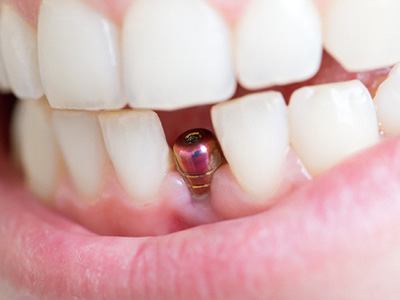
When the surgery ends, your implant will slowly begin to fuse with your jawbone. This process – also known as osseointegration – takes roughly six months. Once it wraps up, your implant will remain as secure as your other teeth.
After the implant fusion, you’ll undergo surgery that places your abutment. (The latter is a connector that holds your implant’s tooth-like portion.) Your final restoration (based on prior impressions) will be crafted as you adjust to the abutment.
Delivery of Dental Implant Restoration(s)
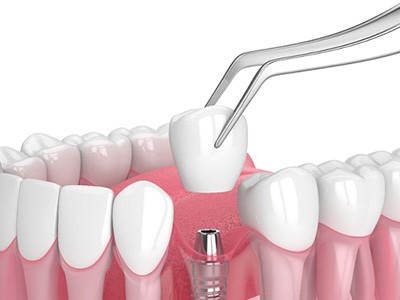
For the final phase of implant treatment, you’ll receive your implant’s final restoration. This prosthetic is usually a crown, bridge, or denture. (The type will depend on how many teeth you’ve lost.)
Overall, fitting this restoration doesn’t take very long. Dr. McElroy will just apply some dental cement and make sure everything is in order. You can then go ahead and enjoy your full, restored smile!
Benefits of Dental Implants

Dental implants are a much sought after tooth replacement option, and with the unique benefits they offer, it’s easy to see why. Patients can enjoy several long-term advantages when it comes to their day-to-day routine and overall health, such as easier chewing and durability that will save you money. When you replace your smile gaps with dental implants in Encinitas, it’ll feel like you simply regrew a new set of natural teeth! Click the button below to see what we mean.
Day-to-Day Benefits

The benefits you’re probably most interested in are the ones you’ll be able to experience in your day-to-day life. After your treatment and recovery, you’ll be able to:
Eat almost anything you want. Dental implants retain 80% of your bite force and are anchored directly to your jawbone, giving you both the power and stability you need to eat your favorite foods with confidence.
Brush and floss like you would with natural teeth. Dental implants are meant to stay fixed in place and mimic your natural teeth in structure as well as appearance – which makes for simpler maintenance.
Talk with ease. Thanks to their ingenious design, dental implants aren’t going anywhere and won’t slip in the middle of a conversation.
Health Benefits

Naturally, you’re invested in the health of your smile. It’s worth knowing that dental implants offer several unique health benefits when compared to other options, such as:
Jawbone loss prevention. When your jawbone doesn’t have a dental root to hold onto, it deteriorates at a faster rate. Only dental implants mimic dental roots, making them the only restoration capable of keeping your jawbone mass intact.
Better nutrition. Better bite force and better stability means better chewing, which helps your body absorb vitamins and minerals more effectively.
Easier oral hygiene. Oral hygiene is one of the most important if not the most important habit you can build for your teeth. A restoration that’s easier to clean means less risk of hidden bacteria causing you trouble.
Avoiding shifting teeth and future orthodontics. Teeth tend to lean and move to compensate for the gaps left behind by missing teeth. Dental implants will keep your pearly whites in place by providing some much-needed support.
Long-Term Benefits

With proper care, your dental implants will last for decades. Imagine being able to enjoy the previous benefits listed for years and years to come. Now add to that even more advantages that will come with time! For example:
Superior comfort. Wear and tear can change the shape of dentures, affecting how they feel in your mouth. Dental implants provide patients with a consistently pleasing fit.
Fewer replacements. Wear and tear also mean that eventually, you would have to replace your dentures or other restorations. Dental implants can outlast them all, saving you both time and money.
Long-lasting smile. Overall, what you get with dental implants is a full smile that you’ll be able to rely on for many, many years!
Who Dental Implants Can Help

As a rather versatile treatment, dental implants can help patients in a variety of situations. Not only that, but there isn’t an upper age limit. So, whether you are in your 20s and missing just one tooth or you’re in your 70s and don’t have any of your natural teeth left, it’s time to schedule a consultation with us to find out if you’re a candidate! Until then, you can read on to learn more about who dental implants can help.
Who Is a Good Candidate for Dental Implants?

Good news: dental implants are incredibly versatile! So, if you are interested in using this state-of-the-art tooth-replacement solution to rebuild your smile, don’t hesitate to schedule a consultation with our Encinitas dental team. At this appointment, we will help you determine whether this is the right option for you by discussing your expectations and smile goals as well as conducting a thorough examination of your oral and facial structure. In some cases, patients may require preparatory procedures before being able to undergo surgery, but we’ll be sure to walk you through what your individual process will look like.
Missing One Tooth

Are you missing just one tooth? Whether it’s one of your molars or one of your front teeth, don’t worry – dental implants are an option! If we determine that you’re a good candidate, then we’ll place a dental implant below the gumline and into the jawbone within the space in your arch. Once you’ve healed and the implant has fused with the bone, we’ll secure an abutment to it that will hold a customized dental crown. The final result will look and feel just like the real thing, ensuring no unwanted attention is drawn to your smile moving forward.
Missing Multiple Teeth

Did you lose several teeth in a sports-related injury or because of advanced gum disease? If so, we have good news: dental implants can replace multiple consecutive teeth or multiple teeth throughout your smile. To fill the gaps, we will secure a dental bridge to two or more dental implants, typically placed on either side of the space within the arch. That way, instead of having to alter your natural teeth to anchor the restoration, it’ll be secured to dental implants. Not only does this result in added stability, but it also adds to their lifelike appearance!
Missing All Teeth

With a custom implant denture, it’s possible for us to restore an entire arch of missing teeth all at once! After strategically placing a small number of implants, the high-quality prosthetic will be securely attached on top. Your new denture may or may not be removable, depending on personal needs and preferences. One thing is the same across the board: the result will be a healthy, complete, and beautiful smile.
Understanding the Cost of Dental Implants

We will need to customize your dental implant treatment according to your unique needs. Naturally, since the process won’t be exactly the same for every patient, neither will the price. There are many factors that could end up affecting the cost of your dental implants, and it’s crucial to make sure that you understand them. You can always get in touch with our team to ask any cost-related questions that are on your mind, but before that, you can get a basic idea of what to expect by reading the information below.
Preliminary Treatments & Dental Implant Surgery
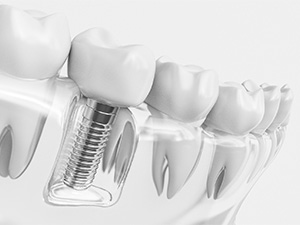
Part of your initial consultation will involve checking to see whether you need preliminary treatments – such as bone grafting or gum disease therapy – to correct issues that could otherwise prevent you from getting dental implants. We will always make sure that you have an idea of how much you can expect to pay for such procedures.
Of course, dental implant surgery has its own costs to keep in mind. The final price could vary depending on which tooth is being replaced as well as whether sedation will be used. We can give you an estimate once we more fully understand what your treatment will entail.
The Parts of Your Dental Implant
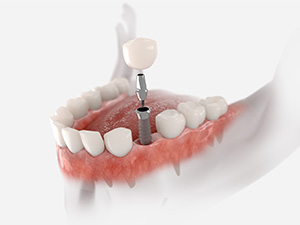
It’s important to take a close look at the dental implants themselves and what factors could influence the amount you end up paying for them. Important factors include:
- The Number of Implants Used: The more dental implant posts you need, the more you can expect to pay for them.
- The Type of Restoration: Will your dental implants support a crown, bridge, or denture? The type of restoration will affect the final price.
- The Material Used: It’s probably no surprise that the cost of a dental implant is closely tied to the material used to make it. Feel free to ask about the material your dental implants will be made out of.
How Dental Implants Can Save You Money

It may not be obvious just by looking at the price, but dental implants can actually end up paying for themselves. What makes them stand out from other tooth replacement options is that they tend to have much longer lifespans; in many cases, they can last for 30 years or more. As a result, dental implants don’t need to be replaced as often as traditional bridges and dentures – and that can be very good news for your wallet.
Does My Dental Insurance Cover Dental Implants?

There’s a good chance that your dental insurance won’t cover the cost of your dental implants, but you might still be able to use your benefits to help pay for the final restoration or related procedures. Talk to our team if you need any help using your insurance benefits to make the cost of getting dental implants more manageable.
Making Dental Implants Affordable

Still worried about your ability to fit dental implants into your budget? Our team may be able to make a few suggestions. For example, you can sign up for our Dental Membership Program to get a discount on various services. You can also apply for third-party financing through CareCredit, Proceed, and Sunbit, all of which can make paying for dental implants notably less stressful.
Dental Implant Post-Op Instructions

Taking care of your dental implants is an essential part of making sure they remain in place for a lifetime. While one of their primary benefits is their extended lifespan, this can only happen if you follow the necessary guidelines provided by our team as well as take proper care of your new smile. On this page, we’ve included some valuable dental implant post-op instructions for you to review. If you have any questions, don’t hesitate to reach out to our office.
What to Do Directly After Dental Implant Surgery

Following dental implant surgery, it’s essential that you take the appropriate steps to avoid dislodging the blood clot(s) that must form in the treated areas of your mouth. These will help you to heal successfully and avoid a potential infection. You’ll need to:
- Get plenty of rest
- Avoid touching or using your tongue to prod your dental implants
- Stop smoking or using tobacco
- Avoid using a straw and don’t spit
Common Side Effects
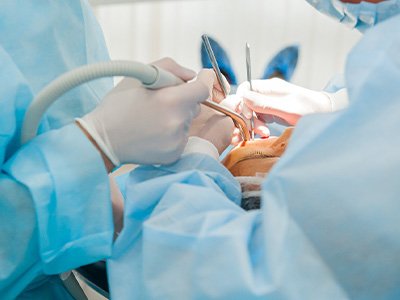
Knowing what is normal and what is not is something our team will happily go over with you before your surgery. This will reduce unnecessary stress so that you can focus on your recovery. After your implants are put into place, you can expect the following:
- Slight discomfort that can be alleviated with an over-the-counter pain reliever
- Some bleeding that can be managed with clean gauze
- Swelling that can last up to one week; however, you can use a cold compress to keep inflammation down
Diet

Eating plenty of soft foods in the days following your procedure is important. On the first and second days, you might try to stick to a liquid diet; however, after all, you can begin to incorporate pudding, oatmeal, lukewarm soup, ice cream, and even mashed potatoes or pasta. Once your mouth begins to heal and feel more like its natural self, you can start enjoying denser foods.
Health & Oral Hygiene

Keeping your smile healthy after dental implant surgery is crucial. The last thing you want is bad bacteria infiltration your surgical sites and causing a serious problem that results in implant failure. This is why you can plan to brush your teeth normally, but you’ll need to be careful when nearing your implants. Also, don’t use alcohol-based mouthwash; instead, swish gently with lukewarm salt water 2-3 times each day.
What to Do After Your New Teeth Are Attached

It’s normal to feel some slight sensitivity once your custom teeth are secured in place, but this sensation should not last long. Otherwise, you should feel no pain or discomfort, and you shouldn’t experience any swelling or bleeding. You’ll be able to start enjoying your new smile and its countless benefits.
Maintaining & Caring for Your Dental Implants

True enough, implants can keep a smile whole and healthy for a lifetime. However, they’ll only do so if you take good care of them. Anything less can cause them to fail and need replacement. Luckily, Dr. McElroy and his team are here to help: below are crucial tips on dental implant care in Encinitas. By reading them over, you’ll ensure your new teeth last a while. You can then enjoy your rebuilt smile without worries!
Make Oral Hygiene a Priority

As you might know, implants don’t get cavities. (They use artificial materials instead of enamel.) That said, you still need to clean them daily. You’ll face long-term oral health issues otherwise.
Remember, implants depend on a healthy mouth to work. That means nearby oral issues can destabilize them. For example, gum disease might make your gums recede and loosen an implant. The condition could also erode the bone tissue that supports your restoration.
Of course, good oral hygiene can prevent these outcomes. It’s simply a matter of brushing twice daily, flossing once daily, and rinsing with mouthwash often.
Eat a Healthy Diet

Implants usually let you eat as you want. Even so, they do have their limits. They work better and longer under a mouth-healthy diet.
You see, some foods put implants at risk. Hard kinds – pretzels, chips, etc. – can result in chips. On the other hand, sticky and sugary stuff tends to wedge between the prosthetics. They then get a chance to decay nearby teeth. Should the latter happen, you might suffer issues that trigger implant failure.
Luckily, other foods with mouth-healthy nutrients let implants endure. Items rich in calcium, phosphorus, and vitamin C are especially good. These prevent gum disease and strengthen your jaw.
Break Bad Habits

Bad oral habits are pretty dangerous to implants. Left unchecked, they can easily cause the prosthetics to break or fail. That being the case, you should quit such practices before and after treatment.
For example, give up smoking. Tobacco products slow your recovery from implant surgery. It also prompts gum disease – an issue that results in implant failure. To prevent these effects, then, stop the habit at least two weeks before implant placement.
You should also quit chewing on hard objects. Whether it’s a fingernail, ice cube, or pencil, biting such a thing can chip your implants.
Protect Your Dental Implants

Implants can withstand a lot, but they aren’t indestructible. They can (and will) get damaged if put under enough force. As such, always protect them with good dental tools.
In particular, wear an oral appliance in certain settings. A sports mouthguard would defend your restoration from physical injuries. Alternatively, using a nightguard while asleep would prevent wear and tear from bruxism.
Schedule Regular Dental Checkups

Even if you’re cautious, you can’t care for implants alone. You’ll inevitably miss or overlook some issues. Therefore, attend dental checkups often. These visits with a dentist offer great protection.
If you didn’t already know, checkups are the best form of preventive dental care. They stop implant threats before they can take root. That much is natural, as they assess your mouth and treat minor issues early. From there, your implants are kept very safe.
Dental Implant FAQs

Dental implants in Encinitas are the next best thing to real teeth, but they are a big investment. Don't worry if you have a few concerns. Your dentist will explain everything during your consultation. While you wait for your appointment, here are the answers to the most frequently asked questions about dental implants to help determine if they are right for you.
Can I Take Dental Implants Out?
You cannot remove a dental implant because it replaces both the root and the crown of your tooth. A titanium post is surgically placed into your jaw to serve as a new root. Your bone will fuse to it through a process called osseointegration. An abutment is placed on the post to connect your restoration. Although some implant dentures can be taken out for easy cleaning, only a trained professional can remove your post.
How Long Do Dental Implants Last?
Dental implants have over a 95% success rate and are proven to last for decades with the correct care. Many factors affect their life expectancy, like the materials used. Your implant dentist in Encinitas will help you choose high-quality materials to get the most from your investment. The location of your implant can also affect its lifespan. Molars undergo more wear and tear, so dental implants used for back teeth may have a slightly shorter duration. You can ensure your new smile lasts for 30 years or more by committing to good oral hygiene at home and visiting your dentist every 6 months for a cleaning and checkup.
Does It Hurt to Get Dental Implants?
You don't have to worry about a painful day in the dentist's chair, despite requiring oral surgery. Your dentist will use anesthetic or sedation to block any pain, so you won't feel anything during your placement surgery. After the effects of any medications dissipate, your mouth will be sore for a few days. You can manage it with an over-the-counter pain reliever and eating soft food. Your dentist will review any additional aftercare instructions before you go home, like using a cold compress to manage swelling and bruising.
What are the Signs of Dental Implant Failure?
The risk of dental implant failure is less than 5%; however, it's important to be vigilant for any signs of an issue. Red, swollen, and bleeding gums can indicate an infection called peri-implantitis. Pain when placing pressure on your implant also indicates a problem. Don't wait to contact your dentist or it can be too late to save your smile.
What Should I Do If My Implant Feels Loose?
After your bone has fused to your dental implant, it should never feel loose. If your implant wiggles, contact your dentist immediately. It can be a sign of dental implant failure, but it may also be something as simple as a loose restoration.
What Can Cause Dental Implants to Fail?
As we mentioned above, the risk of your dental implant failing is less than 5%. That’s due in large part to the extensive vetting process, the latest dental technology, and an understanding of the common reasons they “fail.” The two biggest culprits are peri-implantitis and failed osseointegration, which is why we place an emphasis on good oral hygiene habits and allow plenty of time for the implant to fuse properly with your jawbone.
Am I Too Old to Get Dental Implants?
Sometimes, patients in their 60s, 70s, and 80s think that they are “too old” for dental implants. The reality is that candidacy isn’t determined by age; it’s determined by jawbone density, oral health, and commitment to good oral hygiene habits. So, don’t let your age stop you from scheduling a consultation with us!
Will I Have to Take Off Work for Dental Implant Surgery?
Most patients take a day or two off of work after their procedure so they can focus solely on resting. While this is usually more than enough time, there are some cases where we recommend taking three or more days off, like if your job is physically demanding. If you don’t have a lot of PTO, then consider scheduling your procedure on a Thursday or Friday afternoon so you have the weekend to recover.
Can I Get Dental Implants If I Smoke?
Tobacco use has been linked to a higher risk of dental implant failure. That’s why patients are instructed not to smoke before or after their procedure. In fact, this is a great time to kick the habit altogether! We understand that’s not always easy, which is why we are also here to provide helpful resources and tips. Ultimately, we just want you to have a smile that looks great, is healthy, and adds to your quality of life.
Will People Be Able to Tell That I Have Dental Implants?
Dental implants are extremely lifelike. This is largely because the restorations (i.e., dental crown, dental bridge, denture) are custom-made from natural-looking materials, which ensures that no unwanted attention is drawn to your smile moving forward. Dental implants are also unmatched in stability since they are surgically inserted directly into your jawbone. So, you don’t have to worry – they won’t move out of place when you’re laughing, talking, or chewing.
Is There Anything I Shouldn’t Eat with Dental Implants?
One of the reasons dental implants are so loved is because they restore some of your bite strength that was lost. Although this allows patients to eat a much more varied diet, there are some foods we recommend avoiding, like taffy, peanut brittle, hard pretzels, and candy canes. Instead, focus on incorporating foods into your diet that benefit your oral health, like fresh fruits, seasonal vegetables, and lean proteins.
Do Dental Implants Decay?
No, dental implants do not decay. Of course, that doesn’t mean you don’t need to take care of them. After all, plaque can still build up, and your gums can still develop an infection. So, do your best to commit to a solid oral hygiene regimen, starting with brushing your teeth for a full two minutes every morning.








